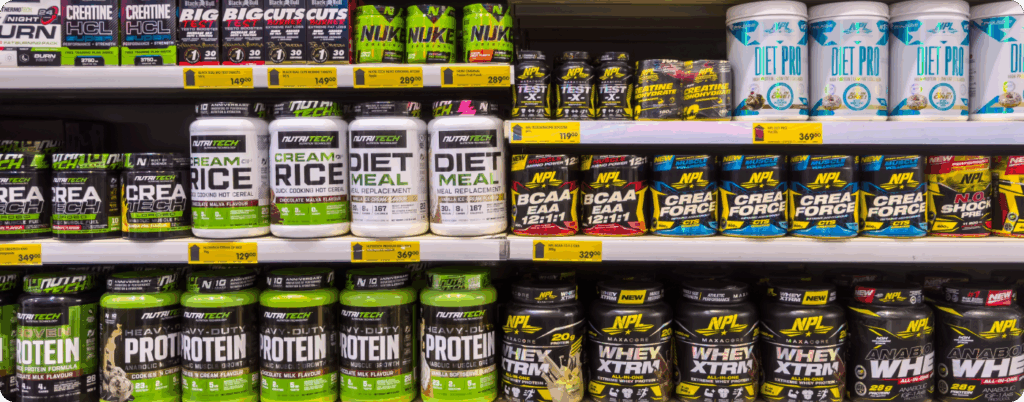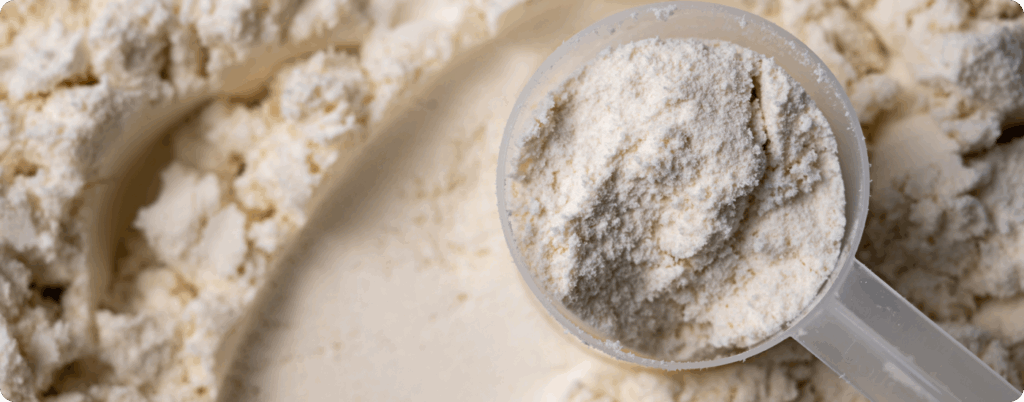PLEASE NOTE: The information in this blog is for educational purposes only. It is not a substitute for professional medical advice. Consult your healthcare provider if you’re seeking medical advice, diagnosis, or treatment.
Picture this: You’re standing in the supplement aisle, overwhelmed by dozens of protein powders promising miraculous muscle gains and lightning-fast recovery. These labels boast impressive claims that may seem great on the surface, but hidden dangers may be lurking in your protein powder of choice.

Recent independent testing has revealed that nearly half of the protein powders on the market exceed safety thresholds for heavy metals, while others contain undisclosed contaminants, including industrial solvents and pesticide residues (1).
For fitness enthusiasts and health-conscious consumers seeking to optimize their nutrition, this revelation can transform protein powder selection from a simple dietary choice into a critical health decision.
In this article, we’ll look specifically at whey protein powder, why it’s so popular, key dangers to be aware of, and why grass-fed whey protein powder can be a perfect alternative.
What is Whey Protein?
Whey protein represents one of two major protein fractions found in milk, the other being casein. When milk undergoes processing for cheese production, the liquid portion that remains—the whey—contains a complete amino acid profile including all nine essential amino acids your body cannot synthesize independently.

This biological completeness, combined with exceptional digestibility and rapid absorption, has positioned whey as the gold standard for supplemental protein. In particular, whey protein is popular among athletes, fitness enthusiasts, active seniors, and those seeking convenient nutrition on the go.
Whey protein can also offer a number of key benefits that help explain its popularity:
1. Muscle Building & Recovery
One randomized, double-blind, placebo-controlled investigation found that participants consuming 40 grams of whey protein blend before and after resistance exercise for 12 weeks showed significantly greater increases in muscle circumference, strength, and exercise volume (2).
Another single-blind study established that 20 grams of whey protein isolate post-exercise maximizes muscle protein synthesis in resistance-trained young men, producing a 49% increase from baseline (3).
2. Immune System Support
Undenatured whey preserves bioactive lactoferrin, immunoglobulins, and alpha-lactalbumin—compounds that boost natural killer cells, enhance macrophage activity, and support antibody responses (4).
Whey can also support glutathione synthesis, often called the body’s “master antioxidant,” which fortifies cellular defenses against pathogens and oxidative stress (5).
3. Vitamins & Minerals
Quality grass-fed whey protein powder can naturally provide essential micronutrients such as iodine, molybdenum, and selenium. Whey protein powder also offers vitamin B12, which can assist with mental alertness, energy levels, and exercise recovery (6).
4. Amino Acids
In addition to vitamins and minerals, grass-fed whey protein powder also contains glycine, leucine, glutamic acid, and other amino acids.
The Problem With Most Whey Protein Powders
Despite the proven benefits of whey protein, buying just any protein powder off the shelf can come with a variety of crucial concerns. In particular, many popular protein powders have challenges thanks to intensive processing, exposure to contaminants, and transparency issues.
Intensive Processing
Most commercial whey proteins result from cheese-making byproducts processed through high-temperature methods, including cross-flow filtration, microfiltration, isolate filtration, hydrolyzation, or ion exchange.
These aggressive techniques strip essential protein-bound fats, alter protein structure, and destroy heat-sensitive bioactive compounds like immunoglobulins and growth factors.
Exposure to Contaminants
Independent testing has also exposed alarming contamination levels across the protein supplement industry. The Clean Label Project’s analysis of 130 protein products found that 40% contained elevated levels of lead, mercury, cadmium, and arsenic (7). Approximately 75% of tested products showed detectable lead levels, with 33% exceeding safe thresholds.
Surprisingly, organic products demonstrated twice the heavy metal contamination of conventional alternatives, and plant-based powders generally had a higher heavy metal burden compared to animal-based options (8).
Exposure to these heavy metals can have various adverse effects on your health, such as reproductive issues, neurological disorders, and other serious concerns (9, 10).
Aside from heavy metals, other studies on protein powders from around the globe have shown exposure to aflatoxins, BPA, and pesticides (11, 12).
Sourcing and Transparency
Studies have also found that protein powder labels can be flat-out wrong or deceptive.
For example, a study in India noted that “the majority of protein supplements did not contain labeled and advertised protein content; certain brands contained more than the labeled or advertised protein content, raising concerns of “protein/amino-spiking” (13).
Grass-Fed Whey From Heart & Soil Supplements: A Superior Alternative
Compared to other online and store-bought options, grass-fed whey protein powder from Heart & Soil offers important differences that can help you be confident that you’re using a high-quality product. Key differences include:

- 100% Grass-Fed Australian Sourcing: Heart & Soil sources whey exclusively from Australian cows grazing on green pastures year-round.
- Minimal Single-Step Processing: Unlike conventional methods that require multiple processing stages at high temperatures, Heart & Soil employs a proprietary single-step process from milk to whey, utilizing the lowest temperatures possible while meeting FDA safety standards.
- NSF Certified for Sport®: This independent third-party certification provides assurance that products are free from banned substances and accurately labeled—critical for competitive athletes subject to drug testing. NSF Certified for Sport® represents the gold standard in sports nutrition verification.
- Zero Artificial Ingredients: The unflavored version contains a single ingredient: grass-fed whey concentrate. No additives, fillers, flow agents, gums, or lecithin.
- Quality Assurance: Each batch undergoes independent testing for heavy metals, pesticides, and impurities, ensuring the grass-fed whey protein powder you consume meets the strictest safety standards. The animals we source from receive no hormone treatments, antibiotics, pesticides, or GMO feed.
In addition to undergoing rigorous testing, grass-fed whey protein powder can be highly versatile and easy to use.
How to Use Grass-Fed Whey Protein Powder
For maximum support of recovery and muscle development, mix 2 scoops (30 grams) of grass-fed whey protein powder in your preferred liquid, delivering 25 grams of complete protein per serving. The optimal timing occurs immediately after your workout.
Store your grass-fed whey protein powder in a cool, dry place away from direct sunlight and moisture.
Grass-fed whey protein from Heart & Soil also comes in two flavors, chocolate sea salt and unflavored, making it a great option for things like:

- Post-workout smoothies: Blend with frozen fruit, milk, maple syrup, and other additions.
- Homemade protein bars: Combine with collagen peptides, dates, raw honey, and other simple ingredients for a portable and filling snack.
- Yogurt enhancement: For added protein, stir into yogurt with fruit and raw honey.
The Bottom Line: Choose Your Protein Powder Wisely
Protein powders have become a key component in health, fitness, and recovery. However, this expansion has created a landscape where quality varies dramatically, and now many popular brands are exposing customers to heavy metals, pesticides, and other contaminants.
Thankfully, it’s still possible to find clean and trusted options to use as part of your health journey.
Whether you’re a competitive athlete demanding certified purity, a fitness enthusiast seeking optimal muscle development, or simply someone who refuses to compromise on nutritional quality, choosing grass-fed whey protein powder means choosing protein supplementation as nature intended—pure, potent, and powerful for better health.
Subscribe to future articles like this: